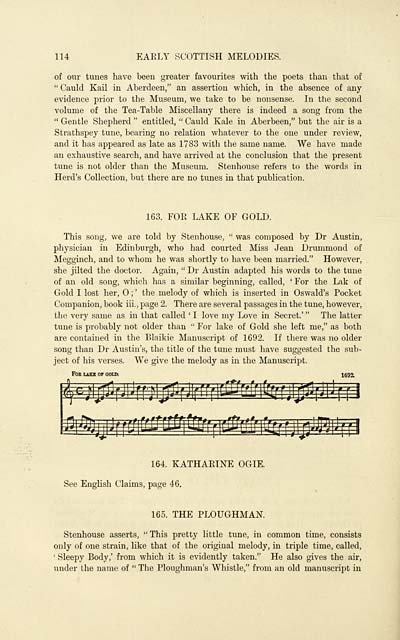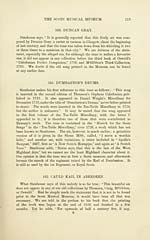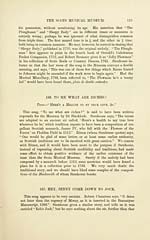Inglis Collection of printed music > Printed text > Early Scottish melodies
(136) Page 114 - For lake of gold
Download files
Complete book:
Individual page:
Thumbnail gallery: Grid view | List view

114
EAELY SCOTTISH MELODIES.
of our tunes have been greater favourites with the poets than that of
" Cauld Kail in Aberdeen," an assertion which, in the absence of any
evidence prior to the Museum, we take to be nonsense. In the second
volume of the Tea-Table Miscellany there is indeed a song from the
" Gentle Shepherd " entitled, " Cauld Kale in Aberbeen," but the air is a
Strathspey tune, bearing no relation whatever to the one under review,
and it has appeared as late as 1783 with the same name. We have made
an exhaustive search, and have arrived at the conclusion that the present
tune is not older than the Museum. Stenhouse refers to the words in
Herd's Collection, but there are no tunes in that publication.
163. FOR LAKE OF GOLD.
This song, we are told by Stenhouse, " was composed by Dr Austin,
physician in Edinburgh, who had courted Miss Jean Drummond of
Megginch, and to whom he was shortly to have been married." However,
she jilted the doctor. Again, " Dr Austin adapted his words to the tune
of an old song, which has a similar beginning, called, ' For the Lak of
Gold I lost her, ; ' the melody of which is inserted in Oswald's Pocket
Companion, book iii., page 2. There are several passages in the tune, however,
the very same as in that called ' I love my Love in Secret.' " The latter
tune is probably not older than " For lake of Gold she left me," as both
are contained in the Blaikie Manuscript of 1692. If there was no older
song than Dr Austin's, the title of the tune must have suggested the sub-
ject of his verses. We give the melody as in the Manuscript.
Foe lake or gold.
1692.
^rJ|JrrfijjtyJl f"7lM%jij3ffi^
Ui^iJfftfiggggitl&ffifgctgiftfffjijJa
164. KATHAEINE OGIE.
See English Claims, page 46.
165. THE PLOUGHMAN.
Stenhouse asserts, " This pretty little tune, in common time, consists
only of one strain, like that of the original melody, in triple time, called,
' Sleepy Body,' from which it is evidently taken." He also gives the air,
under the name of " The Ploughman's Whistle," from an old manuscript in
EAELY SCOTTISH MELODIES.
of our tunes have been greater favourites with the poets than that of
" Cauld Kail in Aberdeen," an assertion which, in the absence of any
evidence prior to the Museum, we take to be nonsense. In the second
volume of the Tea-Table Miscellany there is indeed a song from the
" Gentle Shepherd " entitled, " Cauld Kale in Aberbeen," but the air is a
Strathspey tune, bearing no relation whatever to the one under review,
and it has appeared as late as 1783 with the same name. We have made
an exhaustive search, and have arrived at the conclusion that the present
tune is not older than the Museum. Stenhouse refers to the words in
Herd's Collection, but there are no tunes in that publication.
163. FOR LAKE OF GOLD.
This song, we are told by Stenhouse, " was composed by Dr Austin,
physician in Edinburgh, who had courted Miss Jean Drummond of
Megginch, and to whom he was shortly to have been married." However,
she jilted the doctor. Again, " Dr Austin adapted his words to the tune
of an old song, which has a similar beginning, called, ' For the Lak of
Gold I lost her, ; ' the melody of which is inserted in Oswald's Pocket
Companion, book iii., page 2. There are several passages in the tune, however,
the very same as in that called ' I love my Love in Secret.' " The latter
tune is probably not older than " For lake of Gold she left me," as both
are contained in the Blaikie Manuscript of 1692. If there was no older
song than Dr Austin's, the title of the tune must have suggested the sub-
ject of his verses. We give the melody as in the Manuscript.
Foe lake or gold.
1692.
^rJ|JrrfijjtyJl f"7lM%jij3ffi^
Ui^iJfftfiggggitl&ffifgctgiftfffjijJa
164. KATHAEINE OGIE.
See English Claims, page 46.
165. THE PLOUGHMAN.
Stenhouse asserts, " This pretty little tune, in common time, consists
only of one strain, like that of the original melody, in triple time, called,
' Sleepy Body,' from which it is evidently taken." He also gives the air,
under the name of " The Ploughman's Whistle," from an old manuscript in
Set display mode to: Large image | Transcription
Images and transcriptions on this page, including medium image downloads, may be used under the Creative Commons Attribution 4.0 International Licence unless otherwise stated. ![]()
| Special collections of printed music > Inglis Collection of printed music > Printed text > Early Scottish melodies > (136) Page 114 - For lake of gold |
|---|
| Permanent URL | https://digital.nls.uk/94644904 |
|---|---|
| Description | Also: Katherine Ogie. Also: The ploughman. |
| Description | Scottish and English songs, military music and keyboard music of the 18th and 19th centuries. These items are from the collection of Alexander Wood Inglis of Glencorse (1854 to 1929). Also includes a few manuscripts, some treatises and other books on the subject. |
|---|
| Description | The Glen Collection and the Inglis Collection represent mainly 18th and 19th century Scottish music, including Scottish songs. The collections of Berlioz and Verdi collected by bibliographer Cecil Hopkinson contain contemporary and later editions of the works of the two composers Berlioz and Verdi. |
|---|

